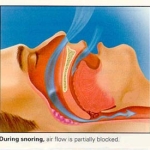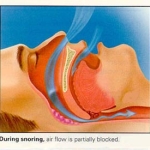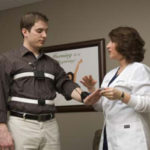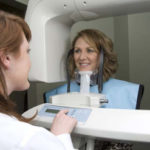What Causes Sleep Apnea to Occur?
Sleep apnea is a condition in which a person’s breathing stops or becomes shallow during sleep This can be caused by a number of factors, including the tongue and muscles relaxing during sleep, the lower jaw falling back toward the throat, and the airway becoming blocked. Treatment for sleep apnea may include oral appliances, CPAP, or surgery. Our specialists at Koala Center For Sleep & TMJ Disorders offer treatment for sleep apnea. We can help you enjoy restful nights and wide-awake days. For more information, please contact us today or request an appointment online. We have convenient locations in Bloomington IL, Peoria/Dunlap IL, El Paso TX, and Wausau WI.
Improve your sleep quality and overall health. Our experts can diagnose and treat sleep apnea, helping you wake up refreshed.
Table of Content:
What is Obstructive sleep apnea (OSA)?
Why sleep apnea occurs?
What are the signs and symptoms of sleep apnea?
How sleep apnea causes snoring?
How do you diagnose sleep apnea?
Breathe easier and live better with Koala Centers For Sleep & TMJ Disorders
What is Obstructive sleep apnea (OSA)?
OSA is characterized by complete airway obstruction. It is often found, but not limited to, older, overweight men and affects significant percentages of women and children as well. If someone in your family has OSA, you will be more likely to have it too. The serious and life-threatening problems start when sleepers begin experiencing apneas, where breathing stops, and hypopneas, where breathing is shallow due to an obstruction. Breathing is usually blocked in the back of the throat because:
- The tongue and muscles relax during sleep.
- The lower jaw falls back toward the throat.
- The airway becomes blocked.
Check Out Our 5 Star Reviews

Why sleep apnea occurs?
A typical sequence of OSA occurs when a person stops snoring and is silent for seconds, or minutes. The body’s oxygen level drops and the blood pressure rises. The heart is forced to beat faster, causing the pulse rate to increase. The brain may cause the arms, legs or whole body to jerk in an attempt to wake the sleeper so breathing will resume. The silence may end with a loud snort, cough or gasp. This causes the sleeper to wake briefly and begin breathing. Once asleep again, the muscles relax and the airway becomes blocked, cutting off the airway again. This cycle can occur hundreds of times per night. Obstructive Sleep Apnea is the most common form of sleep apnea. It ranges in severity from mild to moderate, to severe. Other forms of sleep apnea include Central and Mixed Sleep Apnea.
What are the signs and symptoms of sleep apnea?
Sleep apnea can reveal its presence in a number of ways, and each patient may have a unique combination of symptoms. If you experience any of the following recurring:
- Excessive daytime sleepiness
- Morning Headaches / Migraines
- Snoring
- Weight Gain
- Short Term Memory Problems
- Acid Reflux
- High Blood Pressure
- Depression
- Severe Anxiety
- ADD & ADHD Symptoms
- Choking/Gasping sensation that wakes you up
- Insomnia / Inability to sleep through the night
- Diabetes
- Sore Throat / Dry Mouth
- Slow Metabolism / Inability to lose weight
- Poor job performance or problems in school
- Mouth Breathing /Difficult Nose Breathing
- Restlessness / Tossing and turning during sleep
- Impotence and/or Decreased Sex Drive
- Mood Swings / Temperamental Behavior
How sleep apnea causes snoring?
What Causes Snoring?

Snoring occurs when the soft tissue structures of the upper airway collapse onto themselves and vibrate against each other as we attempt to move air through them. This produces the sound we know as snoring. Large tonsils, a long soft palate, a large tongue, the uvula, and excess fat deposits in the throat all contribute to airway narrowing and snoring. Usually, the more narrow the airway space, the louder or more habitual the snoring.
Snoring Relation to Sleep Apnea

Snoring is the sound of partially obstructed breathing during sleep. While snoring can be harmless, it can also be a sign of a more serious medical condition known as Obstructive Sleep Apnea (OSA). When Obstructive Sleep Apnea occurs, the tongue and soft palate collapse onto the back of the throat and completely block the airway, which restricts the flow of oxygen. The condition known as Upper Airway Resistance Syndrome (UARS), is midway between primary snoring and true obstructive sleep apnea. People with UARS suffer many of the symptoms of OSA but require special sleep testing techniques.
How do you diagnose sleep apnea?
Since OSA is a serious medical condition, it must be diagnosed by a physician. Once a diagnosis of sleep apnea is made, the severity of the dysfunction can be classified and treatment options will be given.
Sleep Studies
A sleep study provides the most accurate picture of how you breathe while sleeping. It measures apneas (when breathing stops) and hypopneas ( when breathing is shallow due to an obstruction), as well as pulse, blood pressure, and other physiological processes like REM sleep, EEG, and leg or arm jerks. Depending on your situation, your doctor may recommend a PSG or a HST.
Polysomnogram (PSG)
A PSG is a sleep study that is done in a sleep lab overnight and monitored by a trained sleep specialist. The patient is hooked up with wires via sticky electrodes to the apparatus that will monitor their sleep channels. The physician associated with the sleep lab will examine the results and interpret the data collected.
Home Sleep Test (HST)

An ambulatory sleep study, or HST, is a convenient monitoring system that the patient can use in the comfort of his own bed. The HST is a small, portable unit that utilizes wireless technology. The data recorded during sleep is then downloaded to a computer the next day. This data is analyzed by a board certified sleep physician
Cone Beam Volumetric Tomography (CBVT)

Like a Medical Cat Scan, but emitting dramatically less radiation, the Cone Beam is a powerhouse of technology used to view and analyze airway passages, tissues, structure and anomalies from the neck up. A board certified oral and maxillofacial radiologist performs the CBVT read and provides an exhaustive report of all findings. Your Koala® Center uses this information to provide optimal treatment for patients as well as shares the findings with the patient’s physician to partner in patient care.
Breathe easier and live better with Koala Centers For Sleep & TMJ Disorders
At Koala Centers For Sleep & TMJ Disorders, we believe that everyone deserves to breathe easier and live better. Our team is dedicated to providing comprehensive, personalized solutions for sleep apnea and TMJ disorders, going beyond the one-size-fits-all approach. We focus on diagnosing the root cause of your symptoms, from chronic snoring and daytime fatigue to jaw pain and headaches. By offering a range of innovative treatments, including custom oral appliances, we help you find a comfortable and effective path to a better night’s sleep and an improved quality of life.
Treatment for obstructive sleep apnea is available at Koala Centers For Sleep & TMJ Disorders. For more information, please contact us today or book an appointment online now! We have convenient locations in Bloomington IL, Peoria/Dunlap IL, El Paso TX, and Wausau WI



Additional Services You May Need
▸ KoalaKIDZzz®
▸ Sleep Apnea
▸ Snoring
▸ TMJ Disorder
▸ Fatigue
▸ Sleep Disorders
▸ Weight Loss
▸ CPAP Alternative
▸ Oral Appliances




